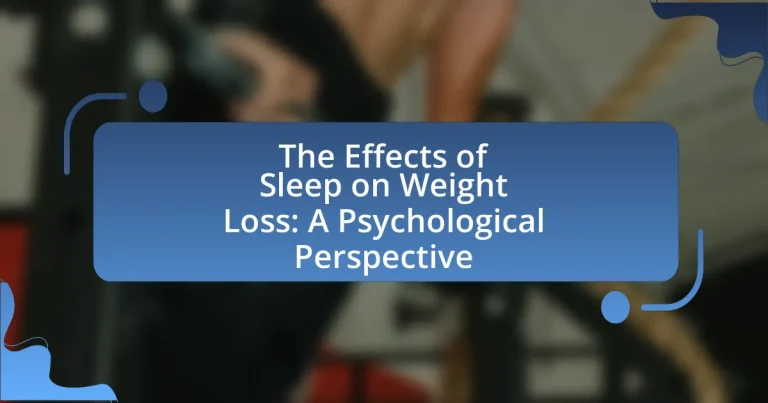The article examines the effects of sleep on weight loss from a psychological perspective, highlighting the critical role of sleep in regulating hormones that influence appetite and metabolism. It discusses how insufficient sleep increases ghrelin levels and decreases leptin levels, leading to heightened appetite and potential weight gain. The article also explores the impact of sleep duration on calorie expenditure, the psychological factors that mediate the relationship between sleep and eating behaviors, and practical strategies for improving sleep hygiene to support weight management. Additionally, it addresses the long-term consequences of sleep deprivation on body composition and weight management, emphasizing the interconnectedness of sleep quality and overall metabolic health.

What are the Effects of Sleep on Weight Loss?
Sleep significantly affects weight loss by regulating hormones that control appetite and metabolism. Insufficient sleep leads to increased levels of ghrelin, the hunger hormone, and decreased levels of leptin, which signals satiety, resulting in heightened appetite and potential weight gain. Research published in the journal “Obesity” by Spiegel et al. (2004) found that participants who were sleep-deprived consumed more calories and had a preference for high-carbohydrate foods, demonstrating a clear link between sleep duration and dietary choices. Additionally, sleep deprivation can impair insulin sensitivity, further complicating weight management efforts. Thus, adequate sleep is crucial for effective weight loss and overall metabolic health.
How does sleep influence metabolic processes related to weight loss?
Sleep significantly influences metabolic processes related to weight loss by regulating hormones that control appetite and energy expenditure. During sleep, the body balances levels of ghrelin and leptin, hormones responsible for hunger and satiety, respectively. Research indicates that insufficient sleep increases ghrelin levels and decreases leptin levels, leading to increased appetite and potential weight gain. A study published in the journal “Obesity” by Spiegel et al. (2004) found that participants who slept only 4 hours per night experienced a 24% decrease in leptin and a 23% increase in ghrelin compared to those who slept 8 hours. Additionally, sleep affects insulin sensitivity; poor sleep can lead to insulin resistance, which is associated with weight gain and obesity. Thus, adequate sleep is crucial for maintaining hormonal balance and metabolic health, directly impacting weight loss efforts.
What role do hormones play in sleep and weight regulation?
Hormones significantly influence both sleep and weight regulation. Key hormones involved include cortisol, leptin, and ghrelin. Cortisol, known as the stress hormone, can disrupt sleep patterns when elevated, leading to poor sleep quality, which in turn affects weight gain by increasing appetite and cravings for high-calorie foods. Leptin, produced by fat cells, signals satiety to the brain; inadequate sleep reduces leptin levels, leading to increased hunger. Conversely, ghrelin, the hunger hormone, increases with sleep deprivation, further promoting weight gain. Research indicates that individuals with poor sleep patterns often experience hormonal imbalances that contribute to obesity, highlighting the interconnectedness of sleep quality and weight management.
How does sleep duration affect calorie expenditure?
Sleep duration significantly affects calorie expenditure, with insufficient sleep leading to decreased metabolic rate and increased appetite. Research indicates that individuals who sleep less than seven hours per night tend to have a lower resting metabolic rate, which can result in fewer calories burned throughout the day. A study published in the journal “Sleep” by Broussard et al. (2016) found that sleep restriction not only reduced energy expenditure but also altered hormonal balance, increasing levels of ghrelin (hunger hormone) and decreasing leptin (satiety hormone). This hormonal shift can lead to increased caloric intake, further impacting weight management and overall energy balance.
Why is sleep quality important for effective weight loss?
Sleep quality is crucial for effective weight loss because it directly influences metabolic processes and appetite regulation. Poor sleep can lead to hormonal imbalances, specifically increased levels of ghrelin, which stimulates hunger, and decreased levels of leptin, which signals satiety. Research indicates that individuals who experience inadequate sleep are more likely to consume higher calorie diets, leading to weight gain. A study published in the journal “Obesity” found that participants who slept less than seven hours per night had a 55% higher risk of obesity compared to those who slept seven to nine hours. Thus, prioritizing quality sleep can enhance weight loss efforts by promoting better hormonal balance and appetite control.
What are the psychological effects of poor sleep on eating behaviors?
Poor sleep significantly impacts eating behaviors by increasing cravings for high-calorie foods and altering appetite regulation. Research indicates that sleep deprivation leads to heightened levels of ghrelin, the hunger hormone, and reduced levels of leptin, the hormone that signals satiety. This hormonal imbalance can result in increased food intake, particularly of unhealthy options, as individuals seek quick energy sources to compensate for fatigue. A study published in the journal “Appetite” by St-Onge et al. (2016) found that participants who experienced sleep restriction consumed more calories and preferred energy-dense foods compared to those who had adequate sleep. Thus, the psychological effects of poor sleep manifest as altered hunger cues and food preferences, contributing to unhealthy eating patterns.
How does sleep deprivation impact cravings and food choices?
Sleep deprivation significantly increases cravings for high-calorie foods and alters food choices. Research indicates that lack of sleep affects the brain’s reward system, leading to heightened sensitivity to food cues and a preference for unhealthy options. A study published in the journal “Sleep” by St-Onge et al. (2016) found that participants who were sleep-deprived consumed more calories, particularly from carbohydrates and fats, compared to those who had adequate sleep. This shift in cravings and food choices can contribute to weight gain and obesity, highlighting the critical role of sleep in regulating appetite and dietary behavior.
What are the long-term consequences of sleep deprivation on weight management?
Long-term sleep deprivation negatively impacts weight management by disrupting hormonal balance, increasing appetite, and promoting weight gain. Research indicates that insufficient sleep leads to elevated levels of ghrelin, the hunger hormone, and decreased levels of leptin, the hormone that signals satiety. A study published in the journal “Obesity” found that individuals who consistently sleep less than seven hours per night are more likely to experience weight gain and obesity over time. Additionally, chronic sleep deprivation can lead to increased insulin resistance, further complicating weight management efforts.
How does chronic sleep loss affect body composition?
Chronic sleep loss negatively affects body composition by promoting an increase in body fat and a decrease in lean muscle mass. Research indicates that insufficient sleep disrupts hormonal balance, particularly increasing ghrelin, which stimulates appetite, and decreasing leptin, which signals satiety. A study published in the American Journal of Clinical Nutrition found that individuals who experienced sleep deprivation consumed more calories and had a higher percentage of body fat compared to those who had adequate sleep. Additionally, chronic sleep loss can lead to metabolic dysregulation, further contributing to weight gain and altered body composition.
What psychological factors contribute to weight gain from lack of sleep?
Lack of sleep contributes to weight gain through several psychological factors, primarily increased appetite and altered food preferences. Sleep deprivation affects the regulation of hormones such as ghrelin and leptin, leading to heightened hunger and cravings for high-calorie foods. Research indicates that individuals who are sleep-deprived tend to choose unhealthy food options, which can be attributed to impaired decision-making and increased impulsivity. A study published in the journal “Sleep” by St-Onge et al. (2016) found that participants with restricted sleep reported greater hunger and consumed more calories compared to those with adequate sleep. Additionally, lack of sleep can lead to increased stress and emotional eating, further exacerbating weight gain.

How do Psychological Factors Mediate the Relationship Between Sleep and Weight Loss?
Psychological factors mediate the relationship between sleep and weight loss by influencing behaviors related to eating, physical activity, and stress management. Insufficient sleep can lead to increased levels of cortisol, a stress hormone that promotes cravings for high-calorie foods, thereby hindering weight loss efforts. Additionally, poor sleep quality affects mood and motivation, which can decrease physical activity levels and increase emotional eating. Research indicates that individuals who experience sleep deprivation are more likely to choose unhealthy food options and have a higher body mass index (BMI). For instance, a study published in the journal “Obesity” found that participants who reported poor sleep patterns had a significantly higher likelihood of obesity due to altered appetite-regulating hormones and increased food intake. Thus, psychological factors such as stress, mood, and motivation play a crucial role in how sleep impacts weight loss.
What psychological mechanisms are involved in sleep and weight loss?
Sleep influences weight loss through several psychological mechanisms, primarily including appetite regulation, emotional eating, and decision-making processes. Insufficient sleep disrupts the balance of hormones such as ghrelin and leptin, leading to increased hunger and cravings for high-calorie foods. Research indicates that sleep deprivation can heighten emotional responses, making individuals more susceptible to stress-related eating, which further complicates weight management. Additionally, lack of sleep impairs cognitive functions, reducing self-control and the ability to make healthy food choices. Studies have shown that individuals who sleep less than seven hours per night are more likely to experience weight gain, highlighting the critical role of sleep in maintaining a healthy weight.
How does stress influence sleep patterns and weight gain?
Stress negatively impacts sleep patterns and contributes to weight gain. When individuals experience stress, the body releases cortisol, a hormone that disrupts sleep quality and duration. Research indicates that elevated cortisol levels are associated with insomnia and fragmented sleep, leading to increased fatigue and reduced motivation for physical activity. Furthermore, poor sleep can lead to hormonal imbalances that increase appetite, particularly for high-calorie foods, thereby promoting weight gain. A study published in the journal “Obesity” found that individuals with chronic stress and poor sleep patterns had a higher likelihood of obesity due to these physiological changes.
What is the role of emotional eating in relation to sleep quality?
Emotional eating negatively impacts sleep quality by leading to increased stress and anxiety levels, which can disrupt sleep patterns. Research indicates that individuals who engage in emotional eating often consume high-calorie, unhealthy foods, which can result in poor digestion and discomfort during sleep. A study published in the journal “Appetite” found that emotional eaters reported lower sleep quality and increased insomnia symptoms compared to those who do not engage in emotional eating. This correlation suggests that emotional eating not only affects dietary choices but also has a significant influence on overall sleep health.
How can improving sleep hygiene support weight loss efforts?
Improving sleep hygiene can significantly support weight loss efforts by enhancing the quality and duration of sleep, which regulates hormones related to appetite and metabolism. Adequate sleep helps maintain balanced levels of ghrelin and leptin, hormones that control hunger and satiety; studies show that sleep deprivation increases ghrelin levels and decreases leptin levels, leading to increased appetite and potential weight gain. Furthermore, better sleep hygiene reduces stress and improves mood, which can decrease emotional eating and promote healthier food choices. Research published in the journal “Obesity” indicates that individuals who prioritize sleep hygiene are more likely to achieve and maintain weight loss compared to those who do not.
What strategies can enhance sleep quality for better weight management?
To enhance sleep quality for better weight management, individuals should establish a consistent sleep schedule, create a conducive sleep environment, and limit exposure to screens before bedtime. Research indicates that maintaining a regular sleep routine helps regulate the body’s internal clock, which can improve sleep quality and support metabolic health. A study published in the journal “Sleep” found that individuals who adhered to a consistent sleep schedule had better sleep quality and lower body mass index (BMI) compared to those with irregular sleep patterns. Additionally, optimizing the sleep environment by keeping the bedroom dark, quiet, and cool can further promote restful sleep, which is essential for weight management. Limiting screen time before bed reduces blue light exposure, which can interfere with melatonin production and disrupt sleep.
How does mindfulness and relaxation techniques impact sleep and weight loss?
Mindfulness and relaxation techniques significantly improve sleep quality and support weight loss efforts. Research indicates that practicing mindfulness can reduce stress and anxiety, which are known to disrupt sleep patterns and contribute to weight gain. A study published in the journal “Obesity” found that participants who engaged in mindfulness meditation experienced better sleep quality and reduced emotional eating, leading to weight loss over time. Additionally, relaxation techniques such as deep breathing and progressive muscle relaxation have been shown to lower cortisol levels, a hormone linked to weight gain, thereby promoting a healthier sleep cycle and facilitating weight management.

What Practical Steps Can Be Taken to Optimize Sleep for Weight Loss?
To optimize sleep for weight loss, individuals should establish a consistent sleep schedule, aiming for 7-9 hours of quality sleep each night. Research indicates that irregular sleep patterns can disrupt metabolic processes and increase appetite-regulating hormones, leading to weight gain. Additionally, creating a sleep-conducive environment—such as a dark, cool, and quiet bedroom—can enhance sleep quality. Studies show that improved sleep quality is associated with better weight management, as it helps regulate cortisol levels and reduces cravings for unhealthy foods. Limiting screen time before bed is also crucial, as blue light exposure can interfere with melatonin production, further impacting sleep and weight loss efforts.
What are the best practices for establishing a healthy sleep routine?
To establish a healthy sleep routine, individuals should maintain a consistent sleep schedule by going to bed and waking up at the same time every day. Research indicates that consistency reinforces the body’s circadian rhythm, which is crucial for optimal sleep quality. Additionally, creating a relaxing bedtime environment, such as dimming lights and reducing noise, can enhance the ability to fall asleep. A study published in the journal Sleep Health found that a calming pre-sleep routine significantly improves sleep onset and quality. Limiting screen time before bed is also essential, as blue light emitted by devices can disrupt melatonin production, leading to difficulties in falling asleep. Furthermore, avoiding caffeine and heavy meals close to bedtime supports better sleep, as these can interfere with the body’s natural sleep processes.
How can one create an optimal sleep environment?
To create an optimal sleep environment, one should ensure a dark, quiet, and cool room. Research indicates that darkness promotes melatonin production, which is essential for sleep regulation, while a cool temperature (between 60-67°F or 15-19°C) enhances sleep quality by lowering the body’s core temperature. Additionally, minimizing noise through soundproofing or white noise machines can prevent disturbances that disrupt sleep cycles. These factors collectively contribute to improved sleep quality, which is linked to better weight management and psychological well-being, as highlighted in studies examining the relationship between sleep and metabolic health.
What lifestyle changes can promote better sleep hygiene?
To promote better sleep hygiene, individuals should establish a consistent sleep schedule, create a comfortable sleep environment, limit exposure to screens before bedtime, and avoid caffeine and heavy meals in the evening. Research indicates that maintaining a regular sleep-wake cycle enhances sleep quality, as highlighted in a study published in the journal “Sleep Medicine Reviews,” which found that irregular sleep patterns can lead to sleep disturbances and negatively impact overall health. Additionally, a comfortable sleep environment, characterized by a dark, quiet, and cool room, has been shown to facilitate deeper sleep, according to findings from the National Sleep Foundation. Limiting screen time before bed reduces blue light exposure, which can interfere with melatonin production, as noted in research from Harvard Health Publishing. Lastly, avoiding stimulants like caffeine and heavy meals close to bedtime can prevent disruptions in sleep onset and maintenance, as supported by studies in the “American Journal of Clinical Nutrition.”
How can individuals track their sleep and its impact on weight loss?
Individuals can track their sleep and its impact on weight loss by using sleep tracking devices or applications that monitor sleep patterns, duration, and quality. These tools often provide insights into how sleep affects metabolic processes and appetite regulation, which are crucial for weight management. Research indicates that insufficient sleep can lead to hormonal imbalances, increasing hunger and cravings, thereby contributing to weight gain. For example, a study published in the journal “Obesity” by Spiegel et al. (2004) found that participants who slept less than 5 hours per night experienced increased levels of ghrelin, a hormone that stimulates appetite, and decreased levels of leptin, a hormone that signals satiety. By consistently tracking sleep data alongside weight changes, individuals can identify correlations and make informed adjustments to their sleep habits to support their weight loss goals.
What tools and apps are available for monitoring sleep patterns?
Numerous tools and apps are available for monitoring sleep patterns, including Sleep Cycle, Fitbit, and Oura Ring. Sleep Cycle uses sound analysis to track sleep stages and provides insights into sleep quality, while Fitbit offers wearable devices that monitor heart rate and sleep duration. Oura Ring combines advanced sensors to measure sleep stages, readiness, and overall health metrics. These tools utilize data analytics to help users understand their sleep habits, which can be crucial for improving overall health and potentially aiding weight loss efforts.
How can one assess the relationship between sleep and weight loss progress?
To assess the relationship between sleep and weight loss progress, one can analyze sleep duration, sleep quality, and hormonal changes related to sleep. Research indicates that insufficient sleep can lead to increased levels of ghrelin, a hormone that stimulates appetite, and decreased levels of leptin, a hormone that signals satiety. A study published in the journal “Obesity” by Nedeltcheva et al. (2009) found that participants who slept less than 6 hours per night lost less fat compared to those who slept 8 hours, despite similar caloric intake. Monitoring these factors through sleep diaries, wearable sleep trackers, and regular weight measurements can provide concrete insights into how sleep impacts weight loss efforts.


